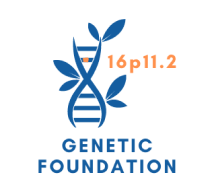Understanding genetics can feel like unraveling a complex mystery, but it’s at the heart of understanding conditions like the 16p11.2 deletion syndrome. Here, we’ll break down the basics of genes and genetic variation, and why they matter in our mission.
What are Genes?
Genes are segments of DNA that provide the instructions your body needs to function. They determine many of your characteristics, like your eye color, blood type, and susceptibility to certain health conditions. Every person has about 20,000-25,000 genes, each carrying a unique set of instructions.
What is Genetic Variation?
Genetic variation refers to the differences in the DNA sequence among individuals. These variations can occur in many forms, such as single nucleotide polymorphisms where one base pair in the DNA sequence is altered, or larger changes affecting segments of chromosomes, such as deletions, duplications, and rearrangements.
Chromosomes and Genetic Variation
Humans typically have 23 pairs of chromosomes, each one a package for carrying hundreds to thousands of genes. Sometimes, a segment of a chromosome may be deleted or duplicated, leading to an imbalance in the genetic material. This is what happens in 16p11.2 deletion syndrome – a small piece of chromosome 16 at a location known as p11.2 is missing.
16p11.2 Deletion Syndrome and Genetic Variation
16p11.2 deletion syndrome is a result of such a chromosomal variation. This deletion can cause a range of physical and mental health issues, including developmental delay, intellectual disability, and an increased risk for autism spectrum disorder.
The variation is not typically inherited but occurs spontaneously during the formation of reproductive cells or in early embryonic development. However, sometimes an unaffected parent may carry a balanced translocation where the 16p11.2 region is swapped with another chromosome region without losing any genetic material, and this can increase the risk of deletions or duplications in offspring.
Why Understanding Genetic Variation Matters
By understanding these genetic variations, scientists can study the impact of missing or altered genes, paving the way for potential therapies and interventions. It also helps us understand why individuals with the same genetic variation can have different symptoms or severities, as other genetic and environmental factors come into play.
Our mission is to advocate, educate, and support research to understand this genetic variation better. By doing so, we hope to bring light to the complexities of 16p11.2 deletion syndrome, improve the lives of those living with it, and provide hope for a future full of potential.
As we unravel the intricacies of our genes, we’re reminded that every person is unique, and understanding our differences brings us one step closer to acceptance, effective treatments, and, ultimately, cures. Join us on this journey of discovery and hope.


